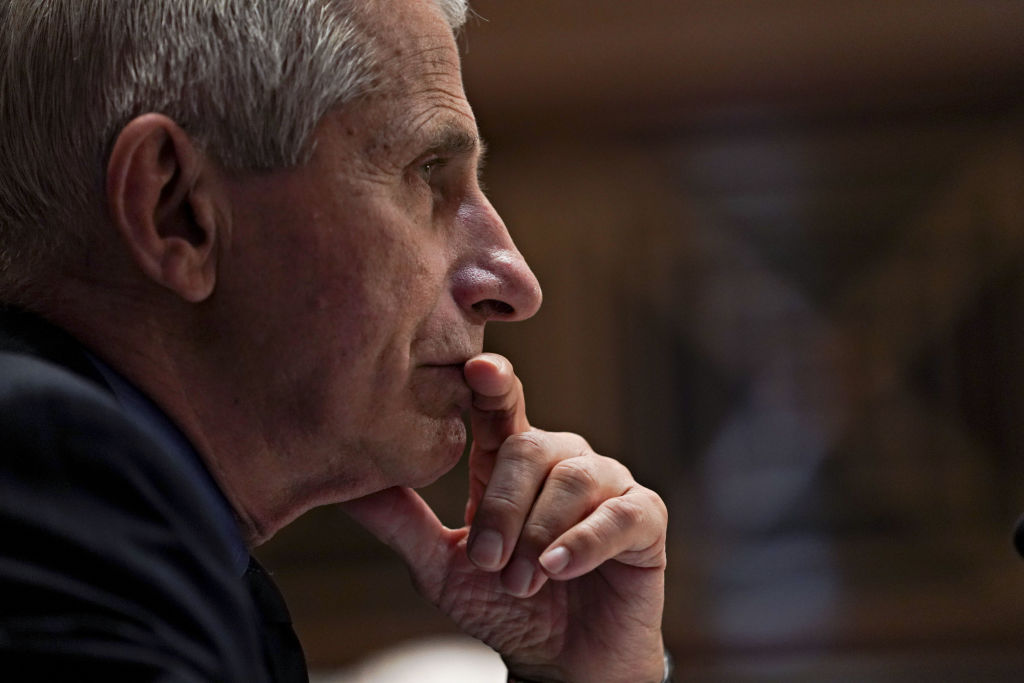Fauci on the 'very, very upending' experience of the last 2 years: 'It has shaken me a bit'


A free daily email with the biggest news stories of the day – and the best features from TheWeek.com
You are now subscribed
Your newsletter sign-up was successful
As the nation rapidly approaches year three of the COVID-19 pandemic, Dr. Anthony Fauci — President Biden's chief medical adviser and leader of the nation's pandemic response — is still wrapping his head about the "surrealistic" experience of the last two, The Washington Post reports.
"I would say I'm in a state of chronic exhaustion," the doctor, who reportedly hasn't had a day off since the beginning of the madness, told the Post. "But it's not exhaustion that's interfering with my function," he added, apparently fearful his words would get twisted by mal-intentioned pundits.
For Fauci, who acted as architect of the AIDS relief program under former President George W. Bush, the politicization of the coronavirus and the attacks against him as a public health official are both novel and confounding, he told the Post.
The Week
Escape your echo chamber. Get the facts behind the news, plus analysis from multiple perspectives.

Sign up for The Week's Free Newsletters
From our morning news briefing to a weekly Good News Newsletter, get the best of The Week delivered directly to your inbox.
From our morning news briefing to a weekly Good News Newsletter, get the best of The Week delivered directly to your inbox.
"It is very, very upending to live through this," the 81-year-old said. "I'm trying to get the right word for it."
"It has shaken me a bit," he added.
Even his friends and peers have their concerns.
"I do worry about him," said former director of the National Institutes of Health Francis Collins.
A free daily email with the biggest news stories of the day – and the best features from TheWeek.com
"Being two years into this, and being at the tip of the spear — it takes a certain person to be able to persevere through that," remarked Michael Osterholm, director of the Center for Infectious Disease Research and Policy at the University of Minnesota. "It's almost like asking someone to run a marathon every day of their life."
"He's always had complete bipartisan support, up until COVID," added AIDS activist Peter Staley, "who once picketed NIH and is now a dear friend of Fauci's," the Post writes.
"It's flat-Earth time," Staley said. "Nothing makes sense." Read more at The Washington Post.
Brigid Kennedy worked at The Week from 2021 to 2023 as a staff writer, junior editor and then story editor, with an interest in U.S. politics, the economy and the music industry.
-
 5 calamitous cartoons about the Washington Post layoffs
5 calamitous cartoons about the Washington Post layoffsCartoons Artists take on a new chapter in journalism, democracy in darkness, and more
-
 Political cartoons for February 14
Political cartoons for February 14Cartoons Saturday's political cartoons include a Valentine's grift, Hillary on the hook, and more
-
 Tourangelle-style pork with prunes recipe
Tourangelle-style pork with prunes recipeThe Week Recommends This traditional, rustic dish is a French classic
-
 A Nipah virus outbreak in India has brought back Covid-era surveillance
A Nipah virus outbreak in India has brought back Covid-era surveillanceUnder the radar The disease can spread through animals and humans
-
 Trump HHS slashes advised child vaccinations
Trump HHS slashes advised child vaccinationsSpeed Read In a widely condemned move, the CDC will now recommend that children get vaccinated against 11 communicable diseases, not 17
-
 Covid-19 mRNA vaccines could help fight cancer
Covid-19 mRNA vaccines could help fight cancerUnder the radar They boost the immune system
-
 FDA OKs generic abortion pill, riling the right
FDA OKs generic abortion pill, riling the rightSpeed Read The drug in question is a generic version of mifepristone, used to carry out two-thirds of US abortions
-
 The new Stratus Covid strain – and why it’s on the rise
The new Stratus Covid strain – and why it’s on the riseThe Explainer ‘No evidence’ new variant is more dangerous or that vaccines won’t work against it, say UK health experts
-
 RFK Jr. vaccine panel advises restricting MMRV shot
RFK Jr. vaccine panel advises restricting MMRV shotSpeed Read The committee voted to restrict access to a childhood vaccine against chickenpox
-
 Texas declares end to measles outbreak
Texas declares end to measles outbreakSpeed Read The vaccine-preventable disease is still spreading in neighboring states, Mexico and Canada
-
 RFK Jr. shuts down mRNA vaccine funding at agency
RFK Jr. shuts down mRNA vaccine funding at agencySpeed Read The decision canceled or modified 22 projects, primarily for work on vaccines and therapeutics for respiratory viruses
